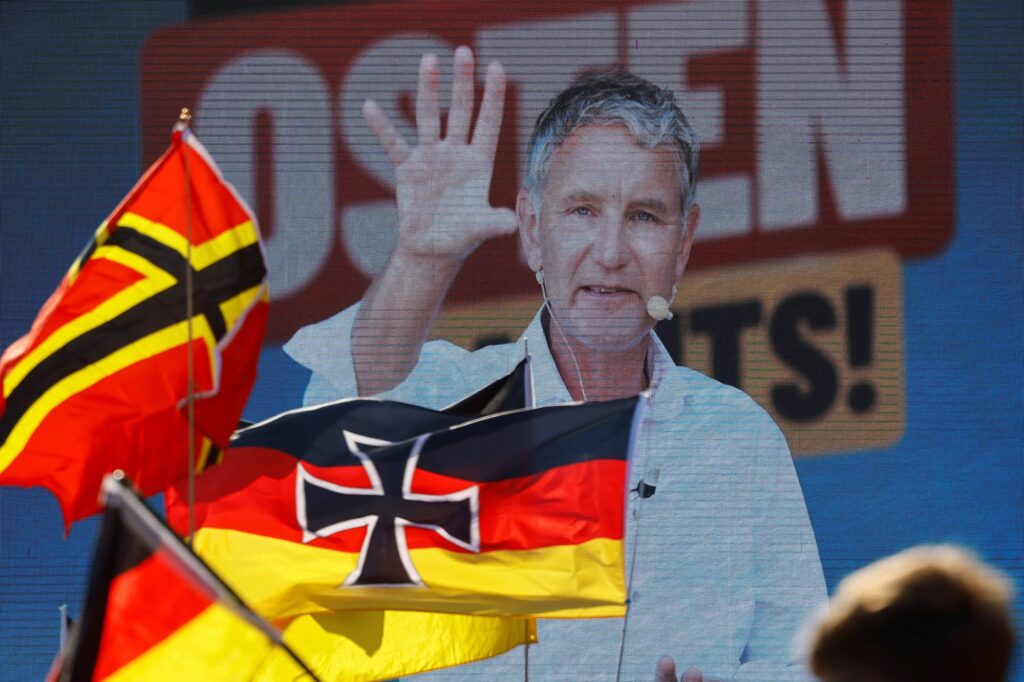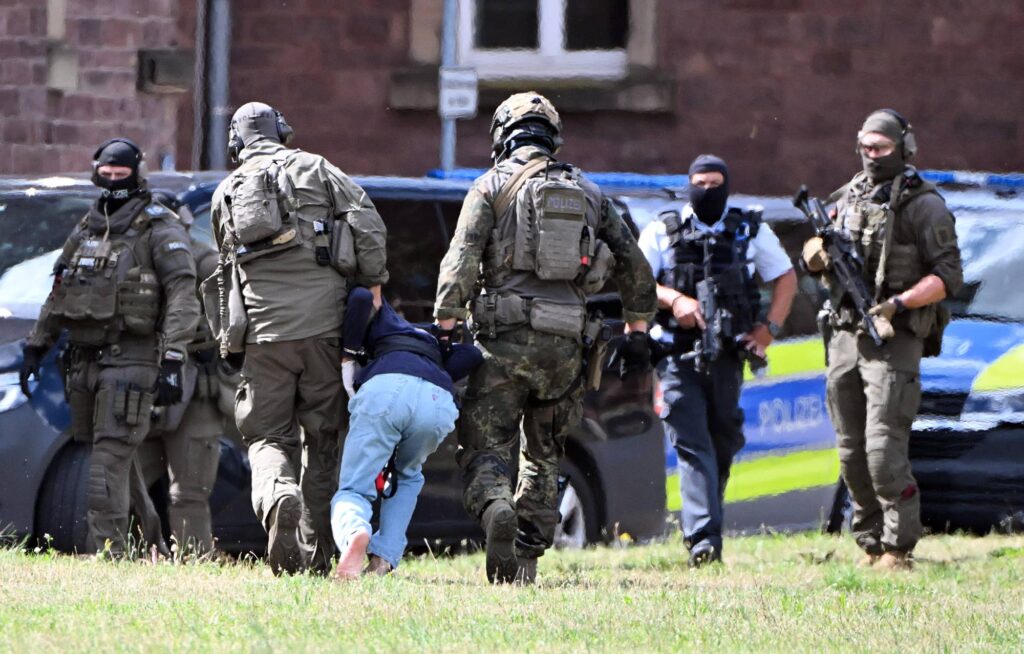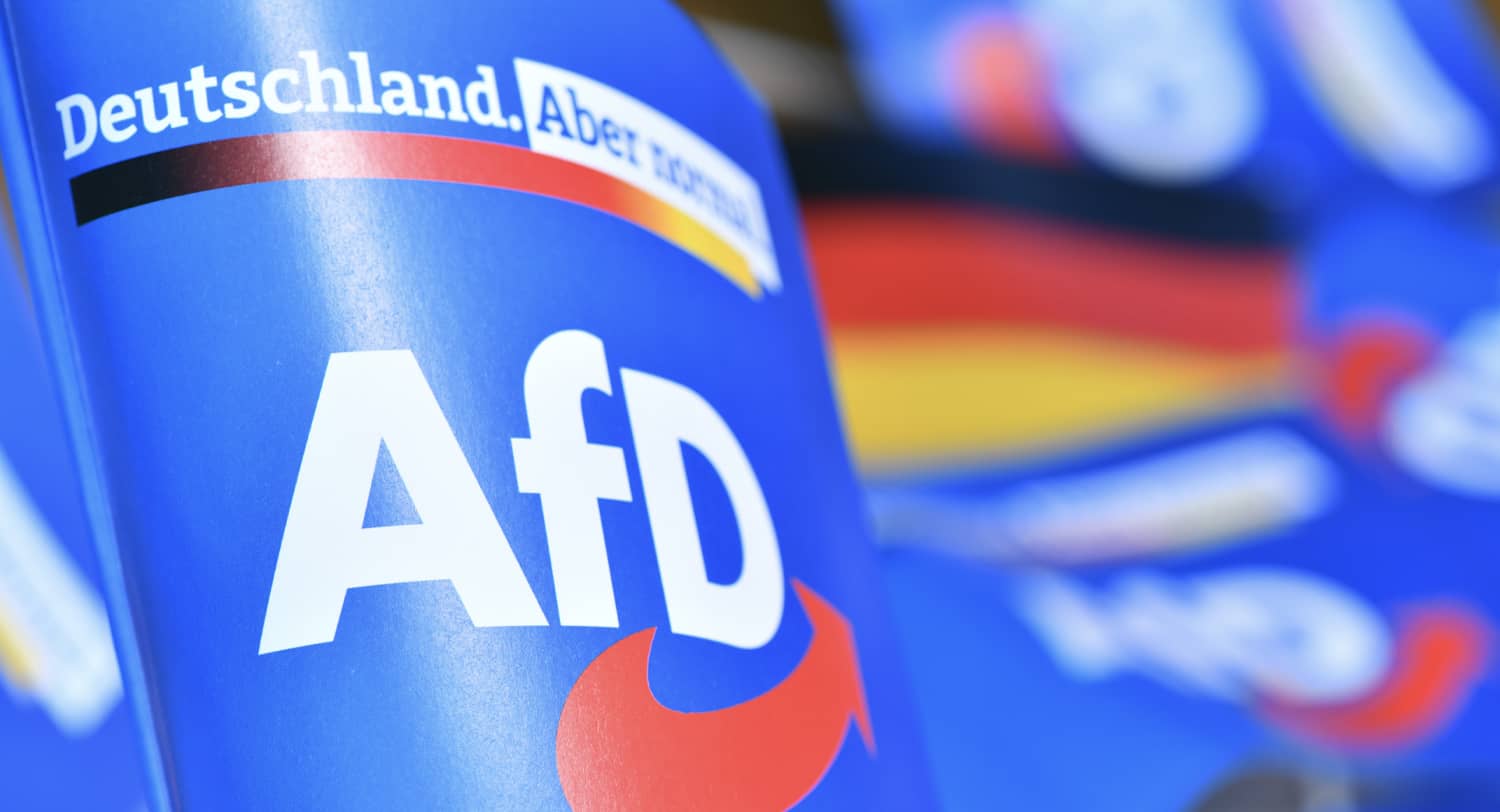Is the “Alt Reich,” the London Spectator recently asked on its cover, about to make a comeback?
Germany, a model of stability for decades, has been thrown into turmoil by the steady rise of the Alternative Party for Germany, especially in its eastern states. On September 1, the 85th anniversary of Hitler’s invasion of Poland and the beginning of World War II, the Alternative Party for Germany won a state election for the first time in Germany’s postwar history. In Thuringia the party came in first place and in second place in Saxony.
It should come as no surprise that the resurgence of nationalism in Germany is reviving memories of the Nazi era at home and abroad. But warnings of a German return to the past have been regularly issued ever since the Federal Republic was founded in 1949. Today, the rise of the right in eastern Germany is cause for concern but not panic.
In Thuringia, former history teacher Björn Höcke is the ideological cynosure of the Alternative for Germany party. Höcke, who, among other things, has insisted that “Hitler was not absolute evil,” saw his party score 33 percent of the vote to become the state’s largest party. In neighboring Saxony, the party finished just behind the center-right Christian Democrats with 30.6 percent of the vote.
It wasn’t just the right that prospered. The radical left, too, did quite well. The Reason and Justice party led by the former communist Sahra Wagenknecht, who was born in Thuringia in 1969, came in third in the elections with 15.8 percent in Thuringia and 11.8 percent in Saxony. Her party, which was only founded seven months ago, preaches a culturally conservative, Euro-skeptic and economically leftist doctrine. She’s now being touted in the German media as a potential kingmaker in the aftermath of the state elections. This leftist firebrand could offer a potential escape hatch for the German political establishment—some Christian Democrats are toying with the idea of forming a coalition government with her in order to fence out the Alternative Party for Germany. But for others, this notion is anathema.
It’s important to remember that the Christian Democratic Party was founded in 1949 and headed by Konrad Adenauer who was a staunch advocate of Westbindung, or ties to the West. Adenauer believed that only by securing itself in the West, as opposed to the traditional Bismarckian policy of jockeying back and forth between East and West for momentary advantage, could the Federal Republic safely secure its future. His policy was vindicated when East Germany collapsed in 1989 and reunification took place.
Today, many of the party’s stalwarts are aghast at the notion of treating with Wagenknecht, likening it to a hostage situation. They have no desire to compromise with either the left or right, and their apprehensions are not unjustified. Even a cursory look at them discloses that a weird parallel between the radical right and left exists in Germany, particularly when it comes to dealing with Russia and Ukraine, not to mention the United States. To many Atlanticists in Germany, both the left and right are in essence functioning as fifth columnists on behalf of Moscow.

Like Höcke, Wagenknecht is a staunch opponent of German ties to NATO and a proponent of close ones to the Kremlin. Wagenknecht is calling for immediate peace negotiations over Ukraine and also opposes the stationing of intermediate-range nuclear missiles in Germany. After Russia invaded Ukraine, she signed a declaration stating that America was “partly to blame” for the conflict and decrying sanctions on Russia and walked out of the Bundestag, or federal parliament, when Ukrainian president Volodymyr Zelenksky addressed it this past June.
So far, the impact of the local elections on the governing coalition in Berlin has been muted. The Social Democrats, Green and Free Democrats have little incentive to end their coalition. None of the three would fare well in new national elections. Chancellor Olaf Scholz is calling for a “firewall” against the far right and Finance Minister Christian Lindner is steadfastly rejecting calls for his liberal Free Democratic Party to exit the government.
The truth is that the radical right and left would only batten on a premature end to the coalition. “Voters want fresh national elections,” declared Alice Weidel, the co-chair of the Alternative for Germany party after the recent state elections. “Scholz and his coalition partners should pack their bags.”
Rather than packing their bags, however, the coalition has begun to crack down on immigration in an attempt to vitiate the far right’s appeal. This represents a reversal of the spirit of former Chancellor Angela Merkel’s embrace of about 1 million refugees from Syria, Afghanistan and Iraq in 2015, when she declared “Wir schaffen das!”–we can accomplish this. As the scramble of the mainstream parties to adopt a harder on asylum seekers indicates, the influx of refugees that Merkel originally welcomed continues to bedevil Germany politically.
With the retirement of Germany’s baby boom generation, the country’s workforce is declining by around 1 percent each year, writes Ishan Tharoor in the Washington Post. It needs additional workers. But more than a few Germans are increasingly restive about the continued flow of immigrants from the Middle East to Berlin and other major cities.
One of the reasons the right has been rising in the polls is because a Syrian citizen, whom the Islamic State claimed was operating on its behalf, went on a rampage on August 23 in the city of Solingen, which was celebrating its 650th anniversary. In all, eleven people were wounded or killed. A national uproar ensued. The result is that mainstream politicians are now calling for toughening asylum laws and deporting illegal immigrants.

Federal migration commissioner Joachim Stamp is proposing deporting migrants from the Middle East to Rwanda. He accused Russian president Vladimir Putin and Belarusian Aleksander Lukashenko of engaging in hybrid warfare by encouraging refugees from Afghanistan, Iraq and Syria to travel to Europe via Moscow and Minsk. In late August, in a widely publicized operation, Germany deported several dozen Afghans who had been convicted of crimes to Kabul.
Meanwhile, Friedrich Merz, the leader of the Christian Democrats, is urging much stiffer immigration measures and ruling out any cooperation with the Alternative for Germany party. It would be “selling the party’s soul,” he said, to enter an alliance with the far-right. Such an alliance, of course, is what led to the installation of Adolf Hitler in power in January 1933, when the Nazis partnered with conservative parties in a coalition government. The demise of the democratic Weimar republic soon followed.
German democracy is not about to collapse, but Berlin seems further than ever from assuming a Teutonic leadership position in Europe. It will be focused on domestic politics for the next several years, particularly as it grapples with an economy that appears to be headed into recession as even its once-proud car industry struggles to maintain its edge. It is Poland, enjoying solid economic growth and investing 5 percent of its gross domestic product into its military, that may be poised to become a leading European power rather than Germany.
It would be a stunning turnabout from the expected future that seemed to await Germany after reunification in 1989. Instead of integration, Germany confronts the dangers of disintegration as the eastern states repudiate the western model that was imported or, if you prefer, imposed, on it after the collapse of East Germany. Resentment at elites in Berlin and Brussels, a limping economy and disquiet over immigration are eroding the social contract that has maintained stability in Germany since 1949. The difficulties that the Federal Republic continues to experience in integrating the eastern German states suggest that more travails await it.

